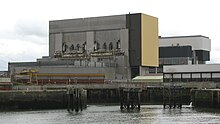Nuclear sites close as more UK workers walkout
Monday, February 2, 2009

Image: Rwendland.
Workers at two nuclear facilities in the United Kingdom walked out today in the continuing row about foreign workers.
Contract staff at the Sellafield nuclear recycling facility in Cumbria walked out this morning. They were joined by staff at Heysham nuclear power station in neighbouring Lancashire. Workers at sites affected by industrial action last week walked out again today, with 200 leaving the Fiddlers Ferry Power Station in Cheshire and a further 1,000 at Grangemouth oil refinery and Longannet power station.
The UK Prime Minister Gordon Brown had condemned the wildcat action on Sunday, calling it "counterproductive". This drew criticism from unions and opposition parties as he had previously promised "British jobs for British workers" at the Labour Party's conference in 2008. Brown has insisted that clarification of European Union law and European Court of Justice decisions will allow people to see that discrimination doesn't take place in future.
The Secretary of State for Business Lord Mandelson has backed the site's owners Total S.A., telling the BBC that the company had "very strongly refuted" the allegations and that he believed them to be right. He added that the media was "feeding this xenophobia". He added that he hoped the rebuttal would calm the situation, saying "I hope in the light of that people will be reassured and call off these unofficial disputes".
This drew an angry reaction from the GMB union. General Secretary Paul Kenny said "Peter Mandelson is in denial about the nature of the problem that has given rise to the dispute. Overseas companies are refusing to employ UK nationals on projects in the UK. That is not right".
Lord Mandelson's shadow, Kenneth Clarke, also condemned the strikes on behalf of the opposition Conservative Party, saying "I understand people being worried about their jobs. I don't think this is the right way to demonstrate it". Some Labour MPs, however, have expressed more sympathy with the strikers. Health Secretary Alan Johnson called for EU law to be changed to stop global companies undercutting local wage rates, while former minister Frank Field said "This form of contract clearly cannot go on, where contracts are awarded and there's free movement of companies but those companies then restrict who can apply for those jobs". Another former minister, Peter Hain, also sided with the strikers, blaming the government for "gold plating" EU law (making EU-derived laws stronger or stricter than the original directive) and telling them to "stick up for British workers". The leader of the Liberal Democrats Nick Clegg sounded a warning note about changing British or EU law, saying that "any attempt to ban EU citizens from jobs in Britain would be a massive own goal. If every EU country followed suit, we would have to cope with a massive influx of British people who work overseas".
The unofficial protests began on Friday, when workers in industrial plants across the country walked out in sympathy with the staff at Lindsey Oil Refinery in North Lincolnshire. The refinery are striking over the awarding of a contract by the French-owned site to an Italian company. This led to 200-300 Italian and Portuguese workers arriving at the plant. Unions allege that British workers were actively prevented from applying for the jobs.
Protests have continued today outside the refinery.
Related news
- "British PM condemns walkouts" — Wikinews, February 1, 2009
- "Mass industrial walkouts in UK" — Wikinews, January 30, 2009
Sources
- Joe Murphy and Dick Murray. "Nuclear plants shut by mass strikes over foreign workers" — The Evening Standard, February 2, 2009
- James Sturcke. "Nuclear power workers join wildcat strike action over foreign labour" — The Guardian, February 2, 2009
- "Sellafield workers stage walk-out" — BBC News Online, February 2, 2009
- Andy McSmith and Andrew Grice. "Wildcat strikes over foreign workers expected to spread" — The Independent, February 2, 2009

